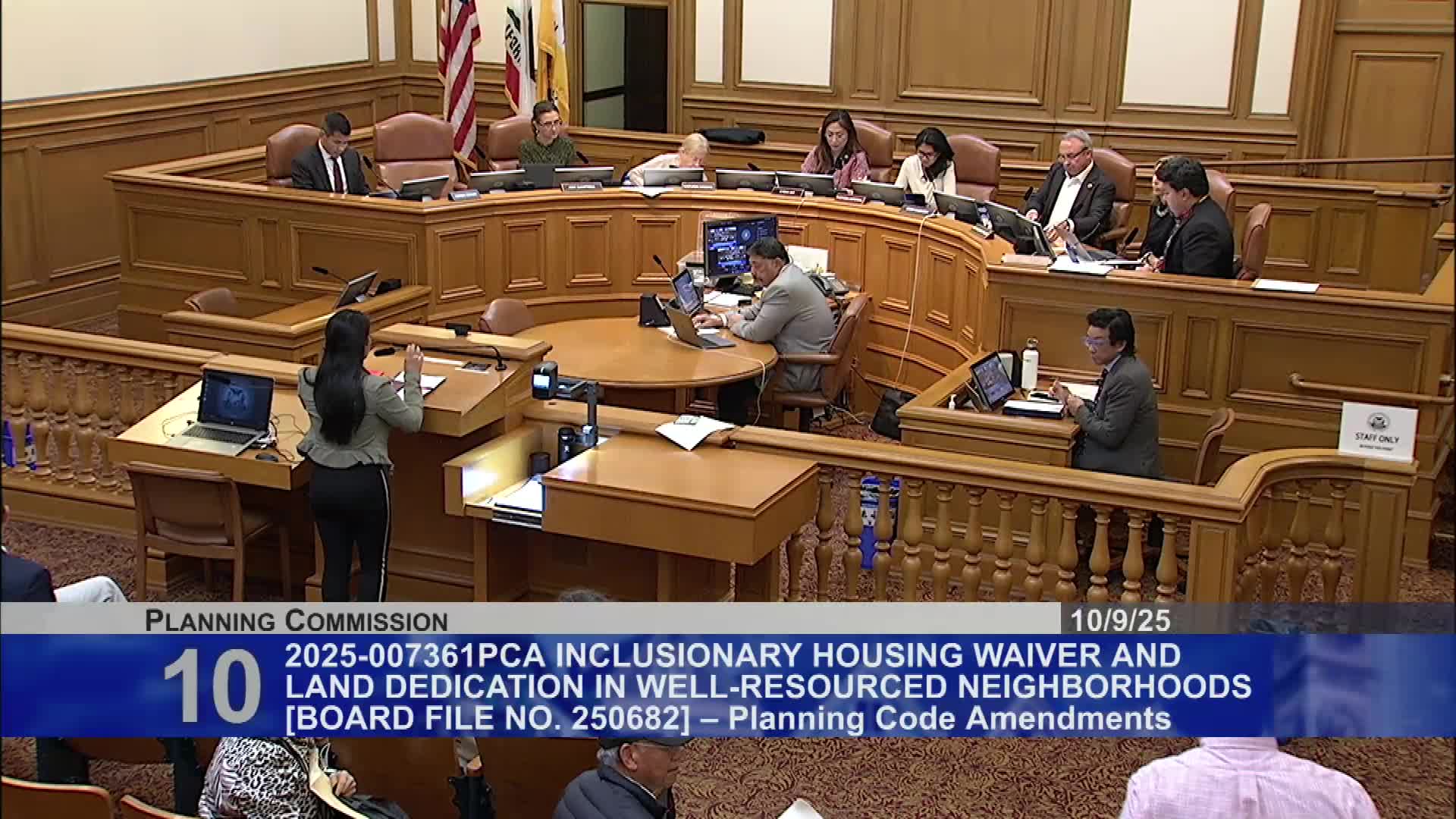Commission backs inclusionary‑housing waiver to spur rent‑controlled units in well‑resourced neighborhoods
Get AI-powered insights, summaries, and transcripts
Subscribe
Summary
The Planning Commission unanimously recommended approval on Oct. 9 of an ordinance that would allow certain projects outside priority equity geographies to satisfy inclusionary requirements by making net new units rent‑controlled or by dedicating land for affordable housing.
SAN FRANCISCO — The San Francisco Planning Commission voted unanimously on Oct. 9 to recommend approval, with modifications, of an ordinance introduced by Supervisor Mirna Melgar that would let certain projects waive the city’s standard inclusionary housing obligations in exchange for: (1) making all net new units subject to rent stabilization for the life of the project under a regulatory agreement, or (2) dedicating land to the city for affordable housing development.
“Instead of doing that, they would, from the get go, have all of their units opt into rent control,” Supervisor Mirna Melgar said, explaining the ordinance’s preferred path. Planning staff described two qualifying paths: securing a regulatory agreement that keeps net new units rental and rent‑controlled, or dedicating land outside priority equity geographies for affordable development.
Veronica Flores of the Planning Department summarized the proposal and staff recommendations: “Under the proposed ordinance, … all net new units in the project [would be] subject to rent control … and they will need to execute a regulatory agreement with the city to reflect and uphold this.” Staff supported the goal of increasing rental housing in well‑resourced neighborhoods, but recommended modifications to prevent unintended loss of affordability — including explicit language to prohibit condominium conversions of newly rent‑controlled units and more specific minimum housing requirements for any land dedication.
Public testimony was mixed. Brianna Morales of the Housing Action Coalition praised the ordinance’s flexibility, saying it “recognizes that a one‑size‑fits‑all inclusionary framework doesn't always produce the housing outcomes we need.” By contrast, Eric Wu of the Chinatown Community Development Center warned that units created under the waiver would be market‑rate at initial occupancy and “would not generate affordability at initial occupancy,” and urged limits, reporting and oversight before a citywide rollout.
Commissioners debated the scope and safeguards. Planning staff proposed applying the waiver citywide; Supervisor Melgar and several commissioners supported limiting it initially to areas targeted by the family‑zoning plan and to well‑resourced neighborhoods where rental stock is scarce. The department recommended several modifications; the commission approved two staff modifications and declined the staff’s recommendation for immediate citywide application.
Key modifications adopted by the commission (motion passed 6–0): - Prohibit condominium conversions of the net new rent‑controlled units and work with the City Attorney to close transfer‑of‑ownership loopholes, including tenant‑in‑common (TIC) transformations. - For the land‑dedication alternative, specify minimum housing capacity: staff proposed a baseline of at least 35% of the potential units that could be provided on the principal site be required on dedicated land (supervisor indicated agreement with this approach).
Additional direction: Commissioners asked staff to work on language to ensure rent‑controlled units are registered with the Rent Board or otherwise tracked, and requested a one‑to‑two year memo back to the commission on the ordinance’s outcomes if it is implemented. Commissioner Campbell moved to recommend approval with staff modifications 1 and 2 (and the added protections for TICs and registry reporting); the motion carried unanimously (ayes: Campbell, McGarry, Braun, Imperial, Moore, President Soh).
Context and tradeoffs: Supervisor Melgar said the measure is intended to increase rental housing and rent‑controlled units particularly on the West Side and in other “well‑resourced” neighborhoods that historically have produced little rental housing. She described the proposal as one tool among several she introduced to expand rental options and funding for deeply affordable housing. Planning staff and community groups emphasized that the waiver would not create deeply affordable units at initial occupancy and that inclusionary in‑lieu fees and bond dollars remain primary sources for subsidized affordable housing.
What the commission approved: a recommendation to the Board of Supervisors to adopt the ordinance subject to the adopted modifications and additional safeguards to prevent loss of long‑term rental affordability.
